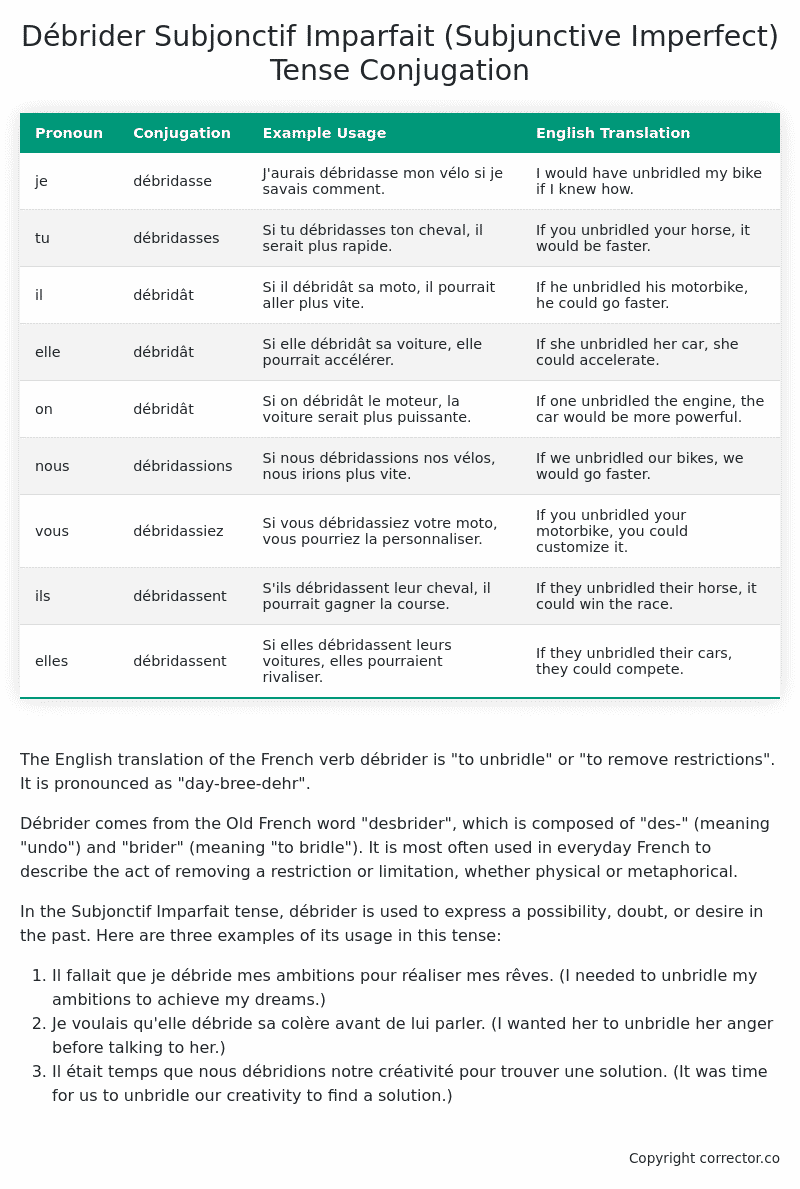Subjonctif Imparfait (Subjunctive Imperfect) Tense Conjugation of the French Verb débrider
Introduction to the verb débrider
The English translation of the French verb débrider is “to unbridle” or “to remove restrictions”. It is pronounced as “day-bree-dehr”.
Débrider comes from the Old French word “desbrider”, which is composed of “des-” (meaning “undo”) and “brider” (meaning “to bridle”). It is most often used in everyday French to describe the act of removing a restriction or limitation, whether physical or metaphorical.
In the Subjonctif Imparfait tense, débrider is used to express a possibility, doubt, or desire in the past. Here are three examples of its usage in this tense:
- Il fallait que je débride mes ambitions pour réaliser mes rêves. (I needed to unbridle my ambitions to achieve my dreams.)
- Je voulais qu’elle débride sa colère avant de lui parler. (I wanted her to unbridle her anger before talking to her.)
- Il était temps que nous débridions notre créativité pour trouver une solution. (It was time for us to unbridle our creativity to find a solution.)
Table of the Subjonctif Imparfait (Subjunctive Imperfect) Tense Conjugation of débrider
| Pronoun | Conjugation | Example Usage | English Translation |
|---|---|---|---|
| je | débridasse | J’aurais débridasse mon vélo si je savais comment. | I would have unbridled my bike if I knew how. |
| tu | débridasses | Si tu débridasses ton cheval, il serait plus rapide. | If you unbridled your horse, it would be faster. |
| il | débridât | Si il débridât sa moto, il pourrait aller plus vite. | If he unbridled his motorbike, he could go faster. |
| elle | débridât | Si elle débridât sa voiture, elle pourrait accélérer. | If she unbridled her car, she could accelerate. |
| on | débridât | Si on débridât le moteur, la voiture serait plus puissante. | If one unbridled the engine, the car would be more powerful. |
| nous | débridassions | Si nous débridassions nos vélos, nous irions plus vite. | If we unbridled our bikes, we would go faster. |
| vous | débridassiez | Si vous débridassiez votre moto, vous pourriez la personnaliser. | If you unbridled your motorbike, you could customize it. |
| ils | débridassent | S’ils débridassent leur cheval, il pourrait gagner la course. | If they unbridled their horse, it could win the race. |
| elles | débridassent | Si elles débridassent leurs voitures, elles pourraient rivaliser. | If they unbridled their cars, they could compete. |
Other Conjugations for Débrider.
Le Present (Present Tense) Conjugation of the French Verb débrider
Imparfait (Imperfect) Tense Conjugation of the French Verb débrider
Passé Simple (Simple Past) Tense Conjugation of the French Verb débrider
Passé Composé (Present Perfect) Tense Conjugation of the French Verb débrider
Futur Simple (Simple Future) Tense Conjugation of the French Verb débrider
Futur Proche (Near Future) Tense Conjugation of the French Verb débrider
Plus-que-parfait (Pluperfect) Tense Conjugation of the French Verb débrider
Passé Antérieur (Past Anterior) Tense Conjugation of the French Verb débrider
Futur Antérieur (Future Anterior) Tense Conjugation of the French Verb débrider
Subjonctif Présent (Subjunctive Present) Tense Conjugation of the French Verb débrider
Subjonctif Passé (Subjunctive Past) Tense Conjugation of the French Verb débrider
Subjonctif Imparfait (Subjunctive Imperfect) Tense Conjugation of the French Verb débrider (this article)
Subjonctif Plus-que-parfait (Subjunctive Pluperfect) Tense Conjugation of the French Verb débrider
Conditionnel Présent (Conditional Present) Tense Conjugation of the French Verb débrider
Conditionnel Passé (Conditional Past) Tense Conjugation of the French Verb débrider
L’impératif Présent (Imperative Present) Tense Conjugation of the French Verb débrider
L’infinitif Présent (Infinitive Present) Tense Conjugation of the French Verb débrider
Struggling with French verbs or the language in general? Why not use our free French Grammar Checker – no registration required!
Get a FREE Download Study Sheet of this Conjugation 🔥
Simply right click the image below, click “save image” and get your free reference for the débrider Subjonctif Imparfait tense conjugation!

Débrider – About the French Subjonctif Imparfait (Subjunctive Imperfect) Tense
Formation
Common Everyday Usage Patterns
Interactions with Other Tenses
Subjonctif Présent
Indicatif Passé Composé
Conditional
Conditional Perfect
Summary
I hope you enjoyed this article on the verb débrider. Still in a learning mood? Check out another TOTALLY random French verb conjugation!


